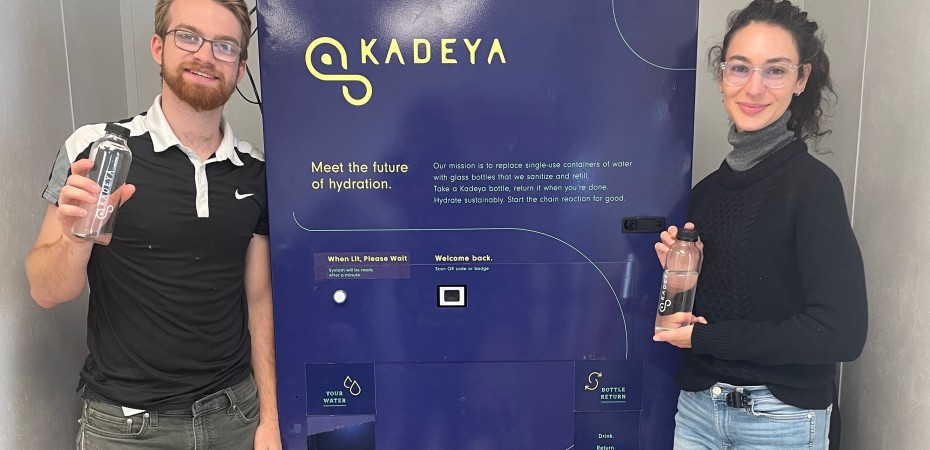Just as bike-share stations revolutionized public access to cycling, Chicago entrepreneur Manuela Zoninsein intends for her startup, Kadeya, to transform access to clean, sustainably packaged water.
“We have a path to ensure that everybody has access to safe drinking water without further contributing to the much-disliked problem of single-use plastic waste and climate change,” she said.
Kadeya is developing small, self-serve vending stations that dispense glass bottles of locally-sourced, purified water. Carbonation and flavoring also are available. Users scan a personalized QR code on their phone to pay, and then they scan it again when returning the bottle to a station for on-site, automated sanitization and reuse.
“You scan your QR code, and instead of unlocking a bike, you unlock a bottle,” Zoninsein said. “When you’re done with your container, you return it to any station in the network. So it’s like [shared] bikes in that regard.”
Another similarity is that digitization allows Kadeya to access data instantly, including how the system is being used and how much daily throughput occurs at each station. This helps to improve the business model, such as examining the potential to add incentives so people return bottles to certain stations with low supply. It also provides insights about how much this system reduces carbon emissions over conventional beverage distribution systems.
“We’re digitizing that entire closed-loop beverage supply chain and providing insights on consumer behavior patterns that no one else has ever been able to capture,” Zoninsein said.
Kadeya recently received pre-seed funding from Evergreen Climate Innovations, following its selection this summer as one of the nine startups to receive funding from Exelon Foundation and Exelon Corporation’s Climate Change Investment Initiative.
“Having smart people on your side who can help you find the right resources and the right insights quickly accelerates the business,” Zoninsein said.
Carbon footprint reduction
Kadeya’s all-in-one, autonomous machines reduce beverage vending’s carbon footprint and make beverage distribution more circular. One of the main factors is eliminating petroleum-derived plastic bottles from the equation.
“You don’t have to source petroleum, and then turn that petroleum into a plastic pellet to ship it to a plant that blows it into a bottle, which then gets shipped somewhere else to be filled with a beverage,” Zoninsein said.
Decentralizing the system eliminates the emissions produced when transporting reusable beverage containers to a central location for inspection, cleaning, and refilling. It also eliminates the backend transportation to distribute refilled containers to vending machines throughout a region.
Obtaining the water from local sources further reduces emissions compared with obtaining it elsewhere and shipping it.
Equitable solution
Kadeya’s initial installations are targeted toward often overlooked populations.
“We are focused initially on workplaces — and not the workplace as you normally think of,” Zoninsein said. Think industrial workplaces where hydration is critical to a worker’s ability to do their job, like manufacturing plants, construction sites, refineries, and fulfillment centers.
The startup focuses on “environments where the workers have been overlooked by innovation as regards to the future of work, but will most need hydration solutions in a warming climate,” Zoninsein said.
“What’s exciting about Kadeya … is that on the one hand, it’s a scalable business with network effects that can really go global quickly. But it reinforces local communities, economies, and environments,” Zoninsein said.
On being Midwest-based
Although being based in the Midwest comes with the well-known challenge of obtaining funding at the same level as coastal startups, the location is actually a benefit, Zoninsein said.
“Kadeya seeks to prove that sustainability and health are not only for the wealthy 1%. If we can prove that starting in the Midwest, it’s a story that can expand nationally, if not globally,” she said. “The Midwest is amazing for us because this is where most vending machines in North America get designed and built and transported from, so there’s that real strength of expertise and talent in the region.”
In addition to having a strong talent pipeline, the Midwest is a hotbed for Kadeya’s primary customer base: industrial sites.
What’s next
Kadeya currently has one machine in the field at a construction site, where it is testing user adoption and engagement.
R&D is wrapping up on the patent-pending hardware, “but the data is going to be the long-term value proposition that accelerates our growth”, Zoninsein said. Kadeya is starting to pre-sell its production units, and they will be deployed within the next year.
“Five years down the road, I would love for every factory, refinery, construction site, and fulfillment center to have completely eliminated single-use plastic containers, to have reduced their carbon footprint by at least 1% permanently with no additional cost, and for their entire workforce to have access to great quality water and never have another injury or death due to heat-related problems,” Zoninsein said.
Photo courtesy of Kadeya

